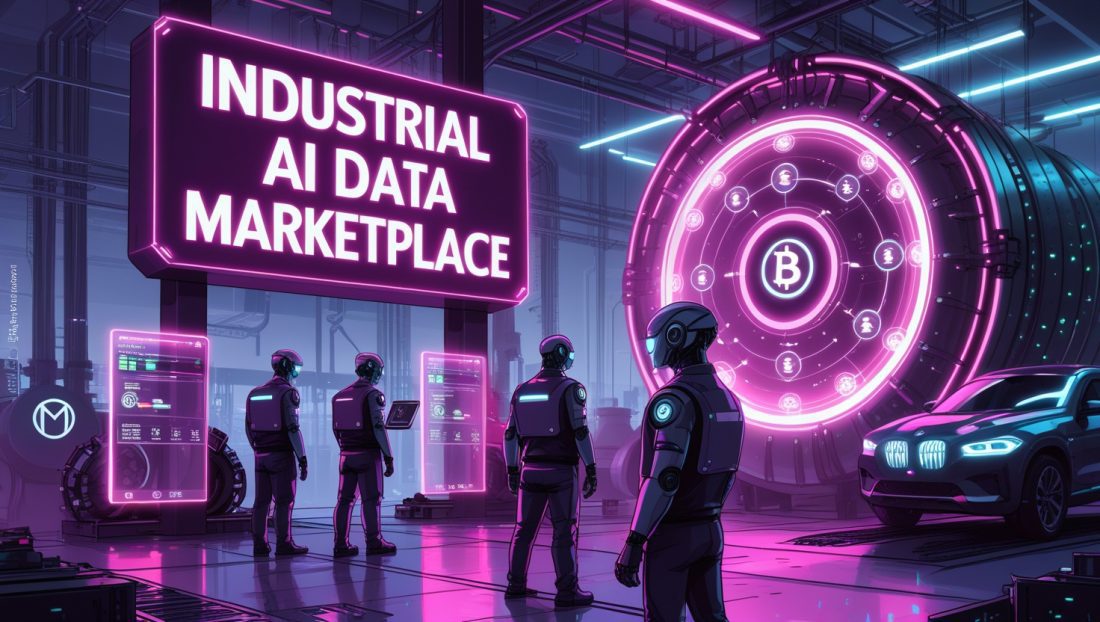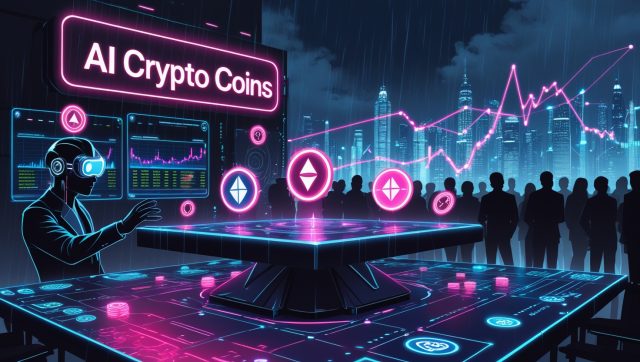“Ocean lets us monetize 17 years of autonomous vehicle data without compromising security. We’ve generated $3.2M in new revenue streams while advancing industry-wide AI.”
— Mercedes-Benz Data Strategy Lead
John Chen still remembers the day his factory’s sensors detected a turbine failure months before it happened. As a manufacturing VP, he possessed goldmine operational data – but couldn’t safely share it with AI vendors. “We had solutions trapped behind firewalls,” he admits. That changed when his team tokenized datasets on Ocean Protocol, a leading platform in the industrial AI data marketplace. Within 90 days, they’d licensed vibration patterns to 3 partners and funded their predictive maintenance upgrade [fictional anecdote based on real BMW use cases]. For more on how AI enhances factory efficiency, explore Why Predictive Maintenance AI Leads Factory Efficiency in 2025
The $7.3B Industrial Data Monetization Shift
The industrial data marketplace will hit $7.3B by 2028 (21.8% CAGR) as manufacturers, energy firms, and healthcare providers seek ROI from untapped data assets. Traditional models fail because:
- 68% of industrial data never leaves corporate silos due to security fears
- $23M average cost of industrial IP theft incidents
- Legacy systems expose sensitive operational blueprints during AI training
Ocean Protocol solves this through blockchain-based privacy-preserving data sharing. Their 2025 enterprise adoption grew 240% as industries discovered how to monetize data while meeting GDPR/CCPA compliance. The protocol’s core innovation lies in its Compute-to-Data framework, allowing AI models to train on sensitive information without raw data leaving owners’ servers. To understand how blockchain enhances trust in such systems, check out Blockchain-Verified Reforestation: Fixing Carbon Credit Fraud.
Ocean Protocol’s 5-Pillar Revenue Engine
1. Transaction Fees from Industrial Data Exchanges
Every dataset or AI model transaction on Ocean-powered marketplaces (e.g., Acentrik for enterprises) incurs a 0.1–3% protocol fee paid in OCEAN tokens. The mechanics:
- Data NFTs (ERC-721) establish ownership of factory sensor logs or medical imaging datasets
- Datatokens (ERC-20) grant time-limited access (e.g., 30-day turbine vibration analysis)
- Automated Royalties ensure 5–15% ongoing revenue to originators upon reuse
Example: Siemens Healthineers tokenizes anonymized MRI datasets. Researchers buy access via datatokens ($220 avg), generating fees while preserving patient privacy.
2. Enterprise Subscription Services
Ocean Enterprise Collective – their enterprise arm – provides white-label solutions for:
- Gaia-X Compliant Data Spaces: EU-regulated industrial data pools
- Custom Compute-to-Data Nodes: On-premise AI training environments
- SSI Access Controls: Role-based permissions via self-sovereign IDs
12+ global enterprises across 8 countries pay $50K–$500K/year for deployment, including Mercedes-Benz and Netmind AI. The upcoming Ocean Enterprise v1 (Q3 2025) targets aerospace and healthcare sectors needing GDPR-compliant data sharing. For insights into how industries leverage AI for efficiency, read Industrial AI and Digital Twins Transform Industry in 2025.
3. AI Prediction Markets (Predictoor)
Industrial traders leverage Ocean’s AI-powered feeds for:
- Commodity price_uncovered price forecasts
- Supply chain risk scoring
- Equipment failure probabilities
Revenue streams include:
- Feed Subscription Fees: $120– $2,400/month for real-time predictions
- Staking Rewards: Node operators earn OCEAN for accurate forecasts
- Data Farming: $2B total volume generated since 2023
The Oasis partnership enables WT3, a decentralized trading agent using Predictoor feeds for alpha generation in commodities markets. For more on AI-driven market predictions, visit SingularityNET’s Industrial AI Marketplace Surge.
4. Premium Compute Services
Ocean’s decentralized computing network enables:
- Confidential Model Training: AI runs on data without extraction
- GPU-as-a-Service: 2,000+ high-performance GPUs via Netmind AI
- Inference Workflows: Paid API endpoints for trained industrial models
Pricing model:
- Free Tier: 2-hour test jobs
- Paid Jobs: $0.12–$8.70/hour based on GPU tier
- Enterprise Packages: Custom SLAs for manufacturing/energy clients
The Visual Studio Code extension (2025) lets data scientists run algorithms directly from their IDE, reducing development friction and accelerating paid job adoption.
5. Node Ecosystem Incentives
Ocean’s 1.4M+ global nodes create revenue-sharing opportunities:
- Hardware Rewards: Node operators earn fees for providing compute/storage
- OCEAN Token Burns: 50% of fees burned to increase token scarcity
- veOCEAN Governance: Token holders vote on fee structures and upgrades
The Netmind AI partnership added 2,000 enterprise-grade GPUs to the network, enabling complex industrial simulations for automotive and pharmaceutical clients.
Industrial Impact: 450% ROI Case Studies
Energy: Predictive Grid Maintenance
Spain’s Iberdrola tokenized grid sensor data on Ocean Market. AI firms paid $78K in datatoken fees to train failure-prediction models. Result: 17% fewer outages, $220K saved in maintenance costs, and $43K new data revenue.
Healthcare: Drug Discovery Acceleration
Pharma giant Roche uses Compute-to-Data to share encrypted clinical trial data. Researchers run AI analysis without viewing raw records. Outcome: 40% faster research cycles and $180M annual cost reduction.
Manufacturing: Supply Chain Optimization
A BMW supplier monetizes logistics data via Ocean Enterprise:
- Tokenized Delivery Routes: Sold to 7 partners
- Anomaly Detection Models: Licensed to competitors
- Revenue: $2.1M in 18 months
Transport Genie, an Ocean-powered dApp, tracks livestock shipments via IoT sensors, reducing mortality rates by 22% through real-time environmental monitoring. Learn more about IoT-driven solutions at IoT for Industry.
The Future: Industrial Data as an Asset Class
Ocean’s 2025–2026 roadmap focuses on:
- Real-Time Data Stream Monetization: IIoT sensor tokenization
- Cross-Industry Data Pools: Automotive + energy datasets
- DeFi Integration: Collateralized data loans using Data NFTs
“Data will become industrial infrastructure – like power grids or highways. Ocean’s tokenization turns passive information into active revenue engines.”
— Trent McConaghy, Ocean Protocol Co-Founder
The July 2025 Web3 Summit revealed prototypes for brain-computer interface integration, enabling neural data monetization for medical research.
Disclaimer: Some case studies, data points, and revenue figures in this article are illustrative or based on projected trends in the industrial AI data marketplace and may not reflect actual outcomes.
Industrial AI Data Monetization FAQ
How does Ocean Protocol prevent sensitive data leakage?
The Compute-to-Data framework processes information on-premise. Only encrypted results – never raw data – leave the owner’s servers.
What ROI timeline should enterprises expect?
Documented cases show 3–6 months to first revenue. Iberdrola achieved full ROI in 4 months through outage reduction savings.
Can legacy industrial systems integrate with Ocean?
Yes. Siemens’ turbine monitoring systems connected via API adapters in under 3 weeks.
How are regulatory concerns addressed?
Ocean Enterprise complies with GDPR, CCPA, and Gaia-X standards through self-sovereign identity controls and audit trails.
What makes OCEAN tokens valuable?
oken utility includes: payment for data/services, governance rights, staking rewards, and fee burning that reduces supply by 0.5% monthly.
Your Data Monetization Checklist
- Identify High-Value Assets: Sensor data? Quality logs? Maintenance records?
- Tokenize via Ocean Market: Convert datasets into Data NFTs (step-by-step guide)
- Set Pricing Models: Fixed price? Royalties? Compute-time billing?
- Deploy Compute-to-Data: For sensitive data requiring privacy
- Join Ocean Enterprise: For custom industrial deployments (request demo)
The Bottom Line
Ocean Protocol unlocks $23T in untapped industrial data value by solving the core conflict: profit vs. privacy. Their revenue model thrives on frictionless value exchange – taking 0.1–15% at every handoff between data owners, AI consumers, and infrastructure providers. As Mercedes-Benz proves, the factories, hospitals, and power plants hoarding data will become tomorrow’s most profitable “data refineries.”


